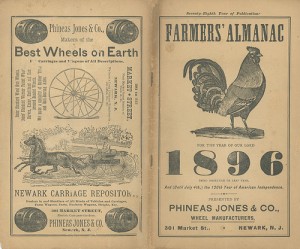 For over two centuries, the Farmers’ Almanac has been predicting weather patterns – but never revealing exactly how. Photo: Flickr/Creative Commons.
For over two centuries, the Farmers’ Almanac has been predicting weather patterns – but never revealing exactly how. Photo: Flickr/Creative Commons.
It solved a murder in the 1939 movie “Young Mr. Lincoln.” It served as a beet farmer’s bathroom reading material in an episode of The Office. And country singer Randy Travis once crooned about a wise man whose only two books included it — and his Bible.
Yes, the Farmers’ Almanac truly has stood the test of time.
And this year, like many before, bloggers, newspapers and local TV stations alike are abuzz with the Almanac’s prediction for winter 2014 — particularly a notably bitter, cold, precipitous winter for the Midwest and most of the Great Lakes region.
“This winter is shaping up to be a rough one,” the almanac reports.
So how much weight does this prediction hold?
“The value of the Farmers’ Almanac in terms of weather forecasting is no better than a comic book,” says Detroit-based meteorologist Paul Gross. “If we knew the forecast a year in advance, we’d be utilizing that knowledge by now.”
The Almanac, which famously keeps its weather predicting methods rather hush-hush, claims to be 80 percent accurate — although the lack of concrete evidence proving that claim draws some skepticism.
The yearly periodical has been published for more than 220 years, but when it comes to the oft-cited weather predictions, the Almanac isn’t trusted by all.
“It’s not something we typically pay attention to,” said Erica Hawkins, communication director of the Ohio Department of Agriculture.
But… the Almanac’s prediction does appear to be somewhat in line with some other organizations’, like the National Oceanic and Atmospheric Adminstration’s. So if it does come to fruition, what would that weather mean for the Great Lakes region?
“The things we’ll worry about are a lot of snow that melts in the spring,” Hawkins said. “A lot of water sitting on the fields later than March often delays the planting process for farmers.”
Hawkins said if this winter does shape up like the Almanac predicts, many farmers in the area would have to adapt.
“We have to watch if it gets too bitter or too cold,” she said. “It can be problematic for livestock kept outside depending on how long or drawn out it is.”
Hawkins’ office isn’t taking too much stock in the predictions, though.
“[The Farmers’ Almanac] is really just not on our radar,” she said.
It can be difficult to trust much of the Almanac’s predictions, some say, when their weather explanations are equally questionable.
An excerpt about the upcoming winter from the Almanac reads: “The good news is that the extra precipitation… will help with any drought issues left over from the summer.”
But it’s hard to make up for lack of precipitation with extra precipitation late in the season.
Heavy precipitation once the ground is already frozen doesn’t help that much with drought issues, said Gross.
“What is best after a dry fall is to have plenty of rain before the ground freezes, so soil moisture is available when the ground thaws in spring,” he said. “Once you get into the winter, rain can’t get very far into the ground.”
The Almanac also makes a questionable remark about the relationship between global warming and a winter with heavy snow.
“Brrrrr!” says the excerpt. “It looks like global warming will soon be taking a vacation to make room for Old Man Winter.”
Heavy snow in winter means quite the opposite in regards to global warming, says Gross.
“What people don’t understand is that global warming means that more ocean water is evaporated into the atmosphere,” he said. “And that water vapor in the atmosphere is what becomes available to storms to create precipitation.”
Global warming isn’t “taking a vacation” to make way for the heavy precipitation, Gross said. Rather, a warming climate cause increased precipitation.
“It’s shocking, but four of Detroit’s top 10 snowiest winters in history have occurred since 2002,” he said.
So although it’s been beloved by pop culture, it looks like it may be best to skip the Almanac’s predictions for this winter (and maybe the rest to come).
“It’s like throwing darts at a dartboard,” said Gross. “Anyone can do it and eventually a few might stick, but it’s not a science.”
Pingback: 2014 PREDICTION WINTER